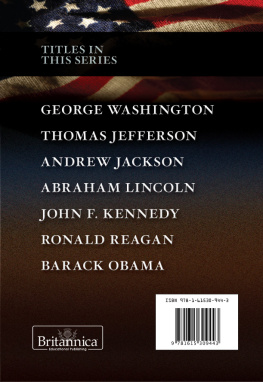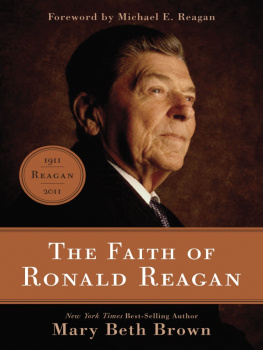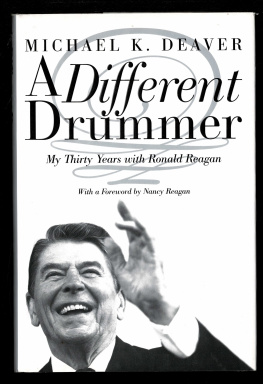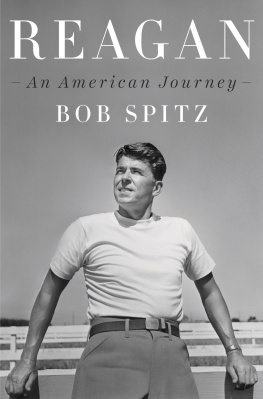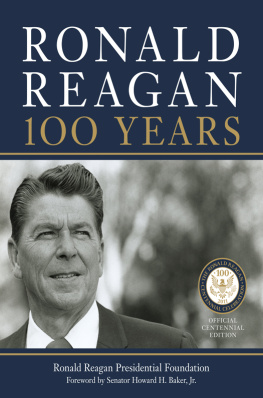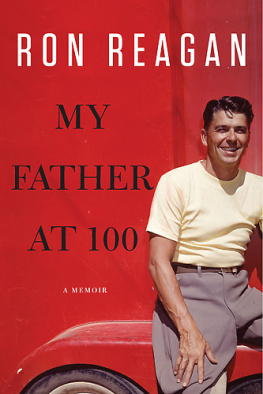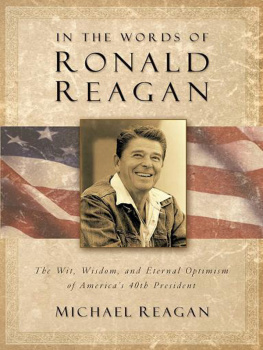Exit with HONOR
THE RIGHT WING IN AMERICA
Glen Jeansonne, Series Editor
Exit with HONOR
The Life and Presidency
of Ronald Reagan
William E. Pemberton
First published 1998 by M.E. Sharpe
Published 2015 by Routledge
2 Park Square, Milton Park, Abingdon, Oxon OX14 4RN
711 Third Avenue, New York, NY 10017, USA
Routledge is an imprint of the Taylor & Francis Group, an informa business
Copyright 1998 Taylor & Francis. All rights reserved.
No part of this book may be reprinted or reproduced or utilised in any form or by any electronic, mechanical, or other means, now known or hereafter invented, including photocopying and recording, or in any information storage or retrieval system, without permission in writing from the publishers.
Notices
No responsibility is assumed by the publisher for any injury and/or damage to persons or property as a matter of products liability, negligence or otherwise, or from any use of operation of any methods, products, instructions or ideas contained in the material herein.
Practitioners and researchers must always rely on their own experience and knowledge in evaluating and using any information, methods, compounds, or experiments described herein. In using such information or methods they should be mindful of their own safety and the safety of others, including parties for whom they have a professional responsibility.
Product or corporate names may be trademarks or registered trademarks, and are used only for identification and explanation without intent to infringe.
Library of Congress Cataloging-in-Publication Data
Pemberton, William E., 1940
Exit with honor: the life and presidency of Ronald Reagan /
William E. Pemberton
p. cm. (The right wing in America)
Includes bibliographical references and index.
ISBN 0-7656-0095-1 (alk. paper) ISBN 0-7656-0096-X (pbk: alk. paper)
1. Reagan, Ronald. 2. PresidentsUnited StatesBiography. 3. United StatesPolitics and government19811989.
I. Title. II. Series.
E877.P46 1997
973.927092dc21
[B]
97-7269
CIP
ISBN 13: 9780765600967 (pbk)
ISBN 13: 9780765600950 (hbk)
To my wife Marty, and in memory of our friend Sage Tsou
Reagan had that dream distance; the powerful thing about him as President was that you never knew how much he knew, nothing or everything, he was like God that way, you had to do a lot of it yourself.
John Updike, Rabbit at Rest
The Right has appalled and consumed historians, who have barely begun to describe and analyze it. Some of them have argued that the Right has no tradition in the United States, or that it is fueled by paranoia or a religious fervor inappropriate to politics. Others have seen it as linked closely to corporate capitalism, to a wealthy elite, to Western romantics longing for nineteenth-century rugged individualism. But the Right has always been a part of American society, whether in the mainstream, on the margins, or misunderstood. For good or ill, it has affected the course of history and warrants a rich historiography (although works on the Right sometimes are confined to obscure corners of academic bookshelves).
The M.E. Sharpe series The Right Wing in America is an attempt to resurrect the Right from the substratum of serious scholarship. By publishing biographies, studies of movements, institutions, and political, cultural, and religious developments from colonial times to the present, the series will present the Right in its variety and complexity and reveal its deep roots. Books in the series are reasonably succinct, thoroughly documented, analytical, and meant to appeal to a general audience as well as scholars and students.
William E. Pembertons provocative biography of Ronald Reagan is the story of a major conservative politician. If Reagan has been an enigma to historians, he is no more of an enigma than some liberal idols such as Franklin D. Roosevelt, who like Reagan was accused of being detached from details in his administration and whose important contribution was inspiration. Reagan rose from a humble background and ascended through the media of radio, motion pictures, and television before entering politics. He married and divorced actress Jane Wyman, then wed another actress, Nancy Davis, with whom he had an idyllic relationship. Shielding himself from the pain of childhood poverty, his alcoholic father, his divorce, and his difficult relationships with his children, Reagan rarely revealed his thoughts to anyone but Nancy. Gregarious, an excellent communicator, he maintained an optimism that often reflected a Hollywood vision of reality rather than reality itself.
Twice elected governor of California, the nations most populous state, Reagan ran unsuccessfully for the Republican presidential nomination in 1968 and 1976 before winning it in 1980 and handily defeating the Democratic incumbent, Jimmy Carter. Having won with promises to cut taxes, increase military spending, and balance the budget, he accomplished the first two at the price of ballooning the budget deficit and the trade deficit. Yet he remained popular regardless of his administrations failures, including the scandal that dogged his second term, the Iran-contra affair, and survived an assassination attempt, showing bravery after he was seriously wounded. In perhaps his greatest achievement, he helped end the Cold War. Like Soviet president Mikhail Gorbachev, he was one of the central figures of his time on the world stage and was instrumental in facilitating arms reductions and the collapse of communism in Eastern Europe.
Pembertons centrist interpretation concludes that despite his flaws, Reagan defended American values and provided spirited leadership. Even in the sunset of Reagans life, it was always morning.
Glen Jeansonne
Ronald Wilson Reagan rose from the obscurity of small-town life in the American heartland to a spectacular career that took him to film stardom in Hollywood, leadership of the American conservative movement, eight years as governor of California, and the first successful two-term presidency since Dwight D. Eisenhower. He had a powerful impact on national life during his years in office, and he had a continuing influence on history because he built the fiscal and political framework within which his successors operated.
Despite the decades he spent in the public eye, he remained a mystery to his friends and admirers. There were many contradictions in his life, career, and personality. While he was an unfailingly gentle and charming man, he distanced himself emotionally from others, erecting a barrier impenetrable even by his closest friends and family members. His unvarying public persona was that of an average American, a citizen-politician, yet from the time he entered the Hollywood film colony in 1937 through his years in Sacramento and Washington he led a cloistered existence, interacting with his countrymen only through the media. He led the American conservative movement to power, but he had started his political career as an outspoken advocate of such notable liberals as Franklin D. Roosevelt, Harry S. Truman, and Hubert H. Humphrey. He spent his career as conservative spokesman attacking big government and federal spending, yet government grew in size during his presidency and deficit spending ballooned to levels never before imagined by American political leaders. His patriotic rhetoric and fervent anticommunist stance caused many citizens to fear that he would be quick to use American military power, but he was restrained in his use of force and, with Soviet premier Mikhail S. Gorbachev, helped bring the half-century-long cold war to an end. He conducted one of the largest military buildups in American history, but concluded the first treaty that reduced nuclear weapons stockpiles. His many admirershe left office after eight years with a 70 percent approval ratingsaw him as a forceful and confident leader, yet he was a disengaged manager who relied on his staff to carry out many of the responsibilities of his office. Liberal critics labeled him an empty suit, and historians ranked him as a below-average president, but he had a major impact on the history of his time. He moved the entire political spectrum to the right and imposed harsh political and fiscal constraints on his successors. Reagan, known as the Great Communicator, lived in a world of sunrises; it was morning again in Gods chosen land, he said. He left his conservative followers with a forward-looking, optimistic promise of a future without limits, a sunny vision that proved popular with voters.


